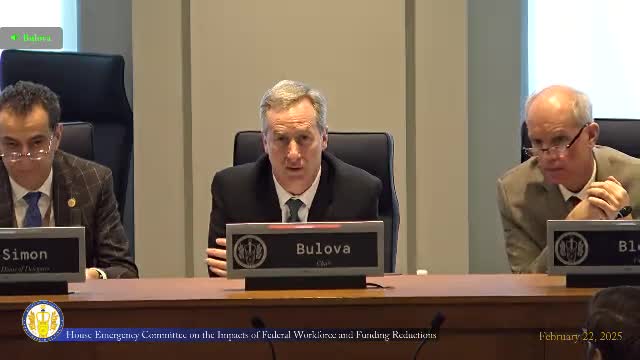Virginia Employment Commission says trust fund is solvent and agency is prepared for federal-related claims
Get AI-powered insights, summaries, and transcripts
Subscribe
Summary
The Virginia Employment Commission told House members the state’s UI Trust Fund held about $1.485 billion and that the agency had prepared processes and digital tools to handle federal employee and contractor claims.
Mitch Melas, commissioner of the Virginia Employment Commission, told the committee that the Unemployment Insurance Trust Fund balance was $1,485,000,000 and that VEC’s solvency measure (the fund balance factor) was about 58%.
Melas explained that unemployment insurance (UI) is intended to provide temporary financial assistance to workers who lose their jobs through no fault of their own and that the Trust Fund is financed by employer taxes. He said federal employers are treated as reimbursable employers (the federal government reimburses the state for federal UI payouts) and that local governments and some state entities can similarly be reimbursable.
Melas gave operational detail on current caseloads: as of the presentation, the VEC had received fewer than 300 initial claims since Feb. 1 from separated federal employees and about 70 confirmed federal unemployment claims in the week ending Feb. 15. Using a sample of top government contractors, VEC had identified roughly 120 contractor-related UI claims in the same period.
Melas described technology and process improvements at VEC since the pandemic: higher online claim rates (75–80%), robotic process automation to speed adjudication, ID verification through ID.me, telephony fraud detection, a redesigned VEC website with a federal-worker landing page and workforce partners such as Virginia Works and the new virginiahasjobs.gov portal for job seekers.
On eligibility questions, Melas told the committee that misconduct (for example, falsifying information or failing a drug test) can render a claimant ineligible, but that poor performance alone typically does not make a claimant ineligible for UI. He also said the statutory maximum benefit is $378 per week for up to 26 weeks. VEC staff said they will continue to coordinate with DC and Maryland colleagues to obtain federal wage records more quickly to reduce wait times for federal-worker claims.
